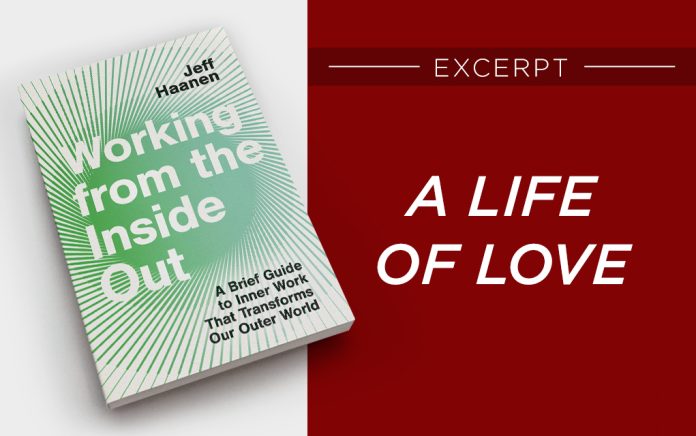The number of church members in the United States is its lowest in modern history, the number of self-professed Christians is plummeting, and we are deeply divided and fragmented. Poet William Butler Yeats wrote, “The falcon cannot hear the falconer; / Things fall apart; the center cannot hold.” In a time when “falcons” are losing the voice of their Caller, can society hold together?
I believe it can. But it requires not just a new program, campaign, or initiative. It requires first that Christians, the salt and light of culture, first become a certain kind of people. The great challenge for the body of Christ today is not to transform society but to transform ourselves. The question we should be asking is not how we change the world. It is first, who are we becoming?
If we are going to become people of love who can clearly reflect the love of their Creator to an unbelieving world, it will require transformation from the inside out.
Transformation takes place first in our interior world, then in our exterior life, and finally in our civic life.
It begins by seeking deep spiritual health and embracing the conviction that deep inner transformation of our emotions and our souls is core to living a fully human life. It includes thinking theologically, a pursuit of truth and wisdom centered on God’s revelation. Change begins in our interior worlds.
Second, transformation occurs when we embrace relationships and create good work. As we allow the Spirit to work within, faith takes on exterior expressions through our daily interactions with family, coworkers, and neighbors, and through our Christian vocations. Change moves to the exterior world.
Finally, change influences our communities when we take on the challenge of leadership and serve others sacrificially, humbly caring for the vulnerable and doing our part to address the big social, economic, and cultural issues of our day. Change finally moves into our civic life.
The final result: a single, holistic life of love, received and understood, expressed and embodied, and finally systematized in our organizations, businesses, cities, and cultures.
Transformation from the inside out is what our world needs. And this is what each of us longs for.
RESERVOIRS, NOT CANALS
So often our lives are not as we long for them to be. Rather than the fruit of the Spirit, our emotional lives are anxious, depressed, and empty. Rather than a life guided by truth, we depend on slogans, social media, and half-truths. Rather than healthy relationships in our families and workplaces, we settle for fractures and wounds. Rather than work filled with purpose, we do what we must to get through the day. Rather than justice and restoration, we swim in a sea of resentment, anger, and societal division.
But it doesn’t have to be that way.
Healing is possible. We can choose to allow our convictions and our actions, our words and deeds, to flow from the same source of life.
The longer I’ve asked questions about my own life, the more I’ve returned to the question: Who am I becoming? What is really inside of me, and what kind of “fruit” do I really grow? Am I drawn more to the four great temptations throughout human history—wealth, power, pleasure, and fame—or the theological virtues of faith, hope, and love? And when I see outbursts of anger come from within, what am I to do?
The key is to first allow God to fill our souls with his living water. Bernard of Clairvaux, a twelfth-century Cistercian abbot, once wrote, “The man who is wise, therefore, will see his life as more like a reservoir than a canal. The canal simultaneously pours out what it receives. The reservoir retains the water till it is filled, then discharges the overflow without loss to itself.”
For years, I had lived more like a canal, eager and ready to “take the next hill,” work to the bone, and press my capacity to the edge. Yet the canal would often run dry. Depleted, my spirit sagged, my resilience wore thin, and those around me paid the price.
The image of a reservoir, filled with the immensity of God’s mercy and grace, however, was a completely new thought. Could I have so much of God’s living water that the challenges I face each day wouldn’t deplete the well of life within? As the prophet Isaiah proclaims,
Come, all you who are thirsty,
come to the waters;
and you who have no money,
come, buy, and eat!
Come, buy wine and milk
without money and without cost. . . .
Listen, listen to me, and eat what is good,
and you will delight in the richest of fare. (Isaiah 55:1-2)
God is offering to us, free of charge, what we all truly long for.
The invitation is not to begin with external markers of success. It is to first receive. To first wait on God’s life and healing before we heal others.
Do not live from the outside in. Live from the inside out. Choose to become a reservoir, overflowing with life from God for the world.
Adapted from Working from the Inside Out by Jeff Haanen. ©2023 by Jeffrey Haanen. Used by permission of InterVarsity Press. www.ivpress.com.

